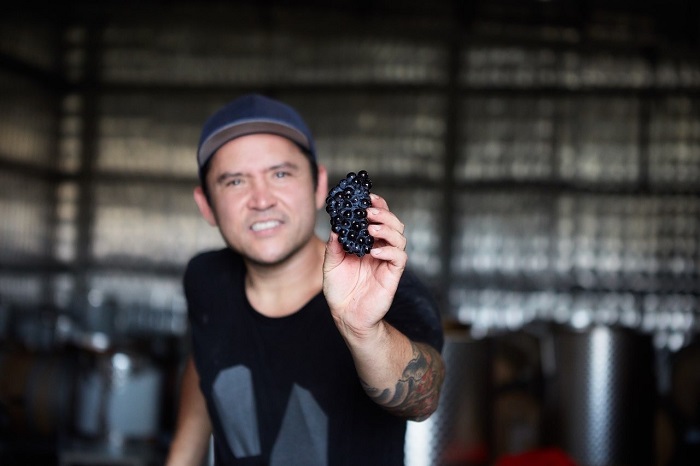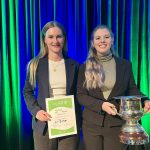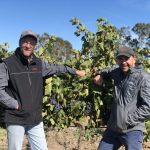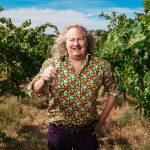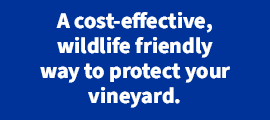It’s been nearly 10 years since he started his first wine label, but Jayden Ong still feels like he’s “early in the piece”. Grapegrower & Winemaker’s Eleanor Danenberg chatted to the Victorian-based first generation vigneron about his four wine labels, his two vineyards, and what it felt like to be called “a star in the making” by Australian wine royalty, James Halliday.
Jayden Ong was born and raised in the south west of Western Australia, and he was living in Perth and working in hospitality when he had his first experiences of wine, “[and] seeing people enjoy wine”. Ong went on a holiday to Melbourne and caught the bug.
“I came here for a summer holiday in 1998 and I ended up staying,” he laughs. Part of the reason for the move was so that Ong could see more live bands and music, he admits, and he also wanted to get more life experience. He started working at the “once-legendary” Melbourne Wine Room, where his connection was only amplified as he saw famous and internationally-acclaimed wines on a daily basis. Thinking more about where these beautiful wines came from inspired Ong to enrol in an Applied Science degree, majoring in Wine Science, at Charles Sturt University.
Ong stayed at the Melbourne Wine Room for six years, then completed a vintage at Curly Flat, in Victoria’s Macedon Ranges, in 2006, at Moorooduc Estate, Mornington Peninsula, in 2007, and at Allies/Garagiste in 2008 and 2009. In 2006 Ong became manager at the restaurant 312, working for his now business partner, chef Andrew McConnell. In 2008 Ong and McConnell co-founded the restaurant and bar Cumulus Inc, where Ong was in charge of beverages and managing the front of house staff. Cumulus Inc spawned a sister site Cumulus Up in 2012, which Ong and McConnell still own and operate today, whilst Ong continues to mentor both venues’ wine teams.
The labels
In 2010 Ong started his own wine label, One Block, which makes single block single vineyard wines where the focus is “something that grows very well in that vineyard, in that region, where it really shines”. The premise is “wines that have a sense of place”, he summarises.
One Block began with a Mornington Peninsula Chardonnay in 2010; then in 2012 that grew to Chardonnay, Pinot Gris, and a Yarra Valley Syrah; and this year, a Mornington Peninsula Pinot Gris, Mornington Peninsula Pinot Noir, Yarra Valley Pinot Noir, and Yarra Valley Syrah have been addded. Next year Ong is planning to introduce another Yarra Valley Chardonnay to the list.
Then there’s La Maison de Ong, which Ong describes as serious wines with a tongue in cheek name. He says some in the Australian wine industry like the idea of their wines looking like Burgundy, “and I always found that strange because we’re not in Burgundy; we have the opportunity with such a very young wine industry to make our own mark and put ourselves on the map”, Ong explains. “The name is tongue in cheek because we’re not French, we’re growing grapes in Victoria, its own place, we should be proud, we should learn what we’ve got here and make this wine exhibit what we have here and not necessarily aspire to be like someone else; we should be inspiring others by what we can do here”. The La Maison de Ong wines are the “alter ego to the One Block minimalism”, using blended vineyard grapes, with the focus being high altitude Yarra Valley reds.
Next came the Moonlit Forest label, the name of which was inspired by the idyllic surrounds of where Ong, his partner Morgan and their young family live. In 2015 the Ongs bought a property comprising a home and land on the top of Mt Toolebewong, 700m above sea level in the Yarra Valley. The property is surrounded by a forest and “when there’s a full moon, it’s like someone is shining a bright light across the tops of the mountain”, Ong tells me. The Moonlit Forest wines are all unfiltered; “there’s nothing to hide. We start with the best quality fruit, make wines with minimal intervention and make them clean
and pure”.
Finally, there are the Jayden Ong Wines, wines that Ong grows, makes, and bottles himself from his two vineyards; one that he planted on their property at the top of the Mt Toolebewong, and the Chestnut Hill vineyard on Mount Burnett, that Ong took over in 2016.
Ong has the four labels on the go at the moment, and he says “they’ve all got their own personalities, stories, and missions”. It’s been nearly 10 years since Ong started his first wine label, and he reflects, “looking back, I feel very happy that I made the decision to follow my own dream”.
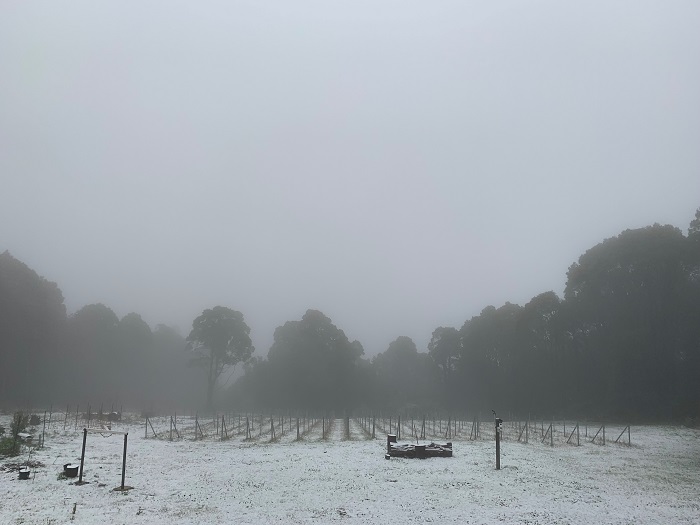
Both sides now
Ong handles the viti side of things at both vineyards, and he says the thing he loves most about his job is that he simply loves growing things — including a couple of hundred linear metres of vegetables, herb beds and a garden at his home. He says he doesn’t think of grapegrowing as farming grapes, but farming the land, and therefore he is wanting to leave the land in a better condition than how he found it. In that spirit, Ong has begun the conversion to organic and biodynamic practices in his vineyards. The Chestnut Hill site was originally planted in 1985 with subsequent plantings in 1994 and 1997, and it began its conversion to organic farming — no pesticides or herbicides — from the day Ong took it over.
For the Mt Toolebewong vineyard Ong was in the fortunate position of being able to start from the very beginning; he decided not to till the soil because it seemed like it had a good balance already. As the site was not surrounded by other farms, there was no risk of spray drift, and Ong didn’t want harsh chemicals on the same site his family lived on.
“Harsh chemicals are certainly something I don’t think we need; they’re not going to help us farm any better,” he said.
Ong illustrates, “it’s all about keeping the vineyard in balance; if we do that it gives us the best opportunity to harvest
good grapes as well as enrich the growing environment. If we can achieve balance in the vineyard then the winemaking side of things is reasonably straightforward; we’ve got high quality fruit and we are just guiding it through to bottle to be pure, and delicious hopefully.”
Ong has a winery on the Chestnut Hill vineyard site, a big insulated shed split over two levels where he also keeps all his bottled and packaged wine ready to ship. Ong exports his wine to China, the United Kingdom, Singapore, the United States, and he will start exporting to Hong Kong later this year. So far his experiences of exporting “have only been positive”. Ong estimates 65 per cent of his wine is sold locally, 30% goes to export, and around 5% is saved for events and private clients.
Contentment and beyond
Ong says his best advice for aspiring grapegrowers and winemakers would be, “travel, to get a greater understanding; read, because you can always learn from other people’s experiences and research; do, or experience is paramount; and if you want to make a difference, don’t to be a prisoner of the past: it’s good to understand what has happened in the past of the wine industry in Australia, but if we are to move forward, there’s room to do something different”.
The way Ong does things has caught the eye of James Halliday and the Wine Companion team, with One Block receiving 5 stars and Halliday calling Ong “a star in the making”. I ask Ong what this meant to him and he’s a bit stumped on how to articulate it, “especially as it was the first time we’ve sent in our wines to be reviewed. It’s a big call, and I hope I can live up to that”.
Ong was also named in the top 12 of the Young Guns of Wine 2019 awards, which he says was great: “It’s about gaining momentum, and I feel like we’re achieving that now. I’m honoured and humbled for those things to be placed upon me and I hope we can continue to move forward”.
“It’s been a good journey so far,” Ong muses. Looking forward, his dream is to achieve contentment; “in no way is contentment meaning lazy”, he clarifies. “More feeling satisfied with where I’m at. Being content with what I’ve achieved and made”.
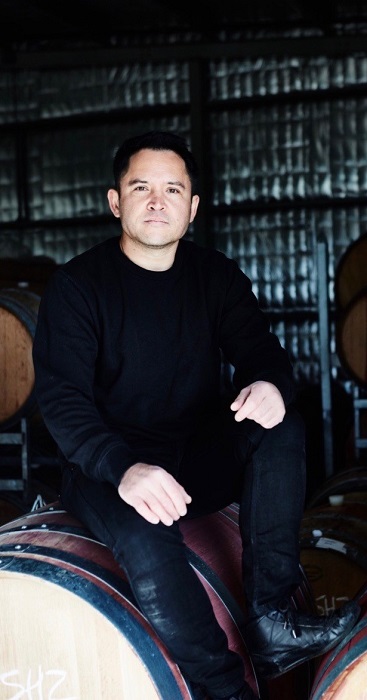
This article was originally published in the September issue of Grapegrower & Winemaker magazine. Subscribe here.

